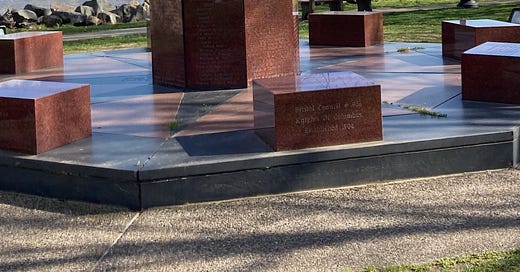
The weekend finds me in Westampton, New Jersey, where I made an appearance at the Burlington County Book Festival. Following my talk, I crossed the Delaware River into Pennsylvania, for a foray into the town of Bristol. It’s a charming little village, as one might expect of verdant Bucks County, what I provincially think of as the Westchester—not West Chester—of greater Philly. Down at the waterfront there’s a promenade at the pier proudly proclaiming the town’s founding in 1681 (catch that? one year before Philadelphia), which rapidly became the largest city in the western hemisphere for a century. Off to my right, I saw a fairly newish monument of a figure I didn’t recognize. I figured it would be William Penn, whose footprint was all over these parts, including South Jersey (I recently spent time in Pennsville, and found a monument to Penn landing in America at New Castle, Delaware). But no: the sculpture at the center of the circle of engraved stones was of Christopher Columbus.
This surprised me. Though it looked from afar like it had been erected in this century, the monument had been dedicated in 1992 to honor the 500th anniversary of his arrival in what was once unselfconsciously called “the New World.” This also surprised me. Where I come from—I refer here not to geography, but the ideological milieu in which I’ve come of age—Christopher Columbus has been regarded with a combination of embarrassment, shame, and anger: a brutal opportunist at the vanguard of settler colonialism. Compared to 1892, for example, when the Columbian Exposition held in Chicago was a major national event that went on for months, 1992 passed in awkward silence. Monuments like this now get removed, not built. And yet here he was, his proud visage looming over a shore he never remotely approached in his lifetime.
Closer examination helped explain the Genoan’s presence. The memorial was the work of the Knights of Columbus—a fraternal organization I kinda assumed had aged out of existence even by 1992—and the engraved stones made clear that he was being honored as much as a symbol of the Italian diaspora as for his navigational exploits (which of course he made playing for team Spain). This is consistent with the history of Italian immigration, much of which was concentrated in greater Philadelphia. Columbus Day was created back in 1937 as a way for President Roosevelt to honor a key working-class immigrant electoral constituency. But Columbus has actually long been a useful political tool from the very beginnings of the United States. After the American Revolution, the awkwardly named King’s College was re-Christened as Columbia, a moniker bestowed on the nation’s capital when it was erected at the time of the tricentennial. In the immediate aftermath of independence, anything Britain was politically incorrect.
Now, of course, Columbus is, too. Which is really my final surprise. I could imagine such a memorial in, say, Red-state Kentucky—if, of course, there were ever much in the way of Italians along the Ohio River. But this particular cultural statement was being made in what has long been the swing state of Pennsylvania, with Bucks County in particular regarded as the swingiest of bellwethers. Obviously, the memorial has no direct relationship to contemporary American politics. Except this: I think people like me tend to underestimate the lingering power of traditional American iconography in everyday life. I find myself wondering whether a day will come when the intelligentsia will reclaim its patrimony, notwithstanding icky prefixes like “patri.” Like Columbus or hate him, most of us wouldn’t be here without him.



I was surprised to find a huge statue of Columbus in the harbor (facing North America) in Barcelona, Spain. The locals I talked to didn’t seem to find it at all incongruous. I don’t see a sway to add any of my mediocre photographs.
Erasure in history is tricky business. Done without caution and perspective, we replicate the fascists.
Few people recognize Columbia as a reference to the explorer, so it gets a pass. However, Despite all the outrage over the Calhoun named house at Yale, there is not a peep coming from any quarter about Elihu Yale’s participation in the slave trade. I guess no one in that community wants a diploma from New Haven University